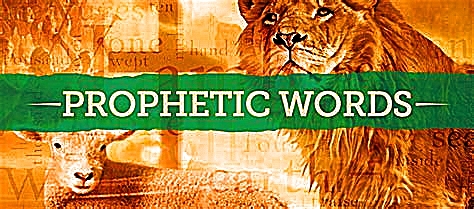Prophetic Rhema – BT8: What is prophecy and how does this relate to Christian music?

Prophetic Rhema – BT8: What is prophecy and how does this relate to Christian music?
Please follow the BLOG Etiquette to stay on topic and pass the moderator’s check. Bold, underlined text below = future links to the BLOG pages.
“Prophetic” is the adjective form of the verb “to prophesy,” which comes from the original Hebrew naba’ that means “religious ecstasy under divine influence with/without singing and/or instrumental music” (a). The Greek verb apophthengomai means “to prophesy: to utter or declare oneself, not of everyday speech, but belonging to dignified or elevated discourse.” Oftentimes the Greek verb propheteuo is used instead, meaning “to prophesy: to assert by elevating one statement over another, thus Spirit-empowered forth-telling.” When words are prophetically spoken by God directly to you so that you directly akouo hear to understand them, these are prophetic rhema words.
Once they are passed on second-hand verbally or through writings, they are no longer rhema words but fall under the term logos, which is used for general communication with the focus on message content instead of the method of delivery. Logos messages can certainly be directly-spoken/heard via rhema words, but rhema words by themselves are not a logos message, especially since the latter can simply be written gramma letters collected into graphe books called scripture. <Notes> a) Spirit-kind-of odes in Ephesians 3:19 and Colossians 3:16 are spontaneous psalms or hymns, respectively with or without vocals, spoken by the Spirit.
Any skilled worldly musician can play an ode (a psalm or hymn) and even play it spontaneously as extemporaneously or improvisationally, but it takes God’s Spirit to make it a “Spirit-kind-of ode” (a), which then makes it anointed, prophetic, and spontaneous! It doesn’t matter if you are a Christian musician or not, unless it’s “spoken” by the Holy Spirit, it’s simply not anointed or prophetic. And if it’s not co-created spontaneously right then and there in the moment by the Holy Spirit, then it’s certainly not anointed, prophetic, spontaneous music. In either case, no matter how much you want to dedicate your skill FOR God, it’s still just a product of the flesh’s “might and power,” and so it is simply not prophetic. <Notes> a) Ephesians 5:19; Colossians 3:16.
Church people can prophesy, cast out demons, and do mighty works in Christ’s name/authority, yet on Judgment Day Christ will say to many “I never experientially, relationally ginosko knew you; depart from Me you workers contrary to the law” (a). What? Is Jesus teaching the Mosaic Torah Law of conditional-favor? No! Remember that torah or nomos generally refers to “principles of instruction.” There were Law-teaching Jewish false prophets then (b), even itinerant exorcists invoking Christ’s name/authority to drive out evil spirits (c), and there will be more in the future even near the end of the ages (c). None of them were then or will be in relationship with Christ, so they were then and will be workers contrary to Christ’s “law” – ‘the law of trusting-relying-faith’ in the Son sent from the Father (e) and the ‘law of Christ’ given by Jesus (f) to unconditionally-love one another as I have unconditionally-loved you (g) – these are the only 2 entole official decrees or commandments in the law of the New Covenant (h). <Notes> a) Matthew 7:23, b) Matthew 7:15; 2 Peter 2:1; 1 John 4:1, c) Acts 19:13, d) Matthew 24:11, 24; Mark 13:22, e) John 6:29, f) 1 Corinthians 9:21; Galatians 6:2, g) John 13:34, 15:12, h) 1 John 3:23.
The distinctive ministry of the New Covenant to and through people to others is absolutely not gramma writings collected into books called graphe scripture, which never referred to anything but the Old Testament until 208 AD when the Catholic theologian Tertullian referred to the NT writings as graphe scripture in order to desperately prove to the Jews that Christians also a “bible” but he was also arguing against Catholics heretics that there were “authoritative NT scriptures.” No Jew in the NT, including Jesus and Paul, or after ever referred to NT writings as graphe scripture.
When the apostle Peter stood up on the first day of the Church when the Holy Spirit was given, just as Jesus told them that the Father had promised (a), Peter didn’t talk at all about “old scripture” or even more “new scripture,” but He did quote the prophet Joel 2:28-29 in Acts 2:16-18 “‘And in the last days it shall be, God declares, that I shall actually pour out My Spirit on ALL (b) flesh and/thus: Your sons and/coupled your daughters shall actually prophesy and/coupled [related phrase introduced:] your youth shall actually envision visions and/coupled your elders shall dream dreams – EVEN (ge = qualifying emphasis) on MY male servants and/coupled MY female servants in those days I will actually pour out MY Spirit and/thus they shall actually prophesy.” <Notes> a) Luke 24:49; Acts 1:4, 2:33, b) As here, pas rarely means “the whole of” but more often “each of a kind or category of” – the context “whittles down” the meaning through coupling/relating phrases and qualifying emphasis to God’s “male and female servants.”
The Greek structure of Acts 2:16-18 is written in a series of qualifying phrases, as Hebrew poetry is: “Your sons coupled with your daughters” qualifies “all flesh” – the whole world didn’t get the Spirit that day, but only “each of a certain kind/category,” just as pas translates in many cases. For example, Paul’s saying: “All (pas) scripture, God-breathed [ones], these are useful for teaching, etc.” in 2 Timothy 3:16 is not “the whole of” as many erroneously assume, but “each of a kind/category of,” which is clearly defined in v. 3:15, the “sacred gramma writings from childhood you [Timothy] have been acquainted with,” which is further qualified by the next phrase: “which are able to make you wise for salvation through trusting-relying-faith in Christ Jesus.” See Logos Word of God – BT7. The Torah Law of conditional-favor never accomplished any of this, and so Paul forbid teaching of the Mosaic Law in churches per Romans 16:17; 1 Timothy 6:20; 2 Timothy 2:16; Titus 3:9; and 2 Corinthians 3:7-15. They did use 2.6% of the OT that were prophetic “oracles” concerning the Messiah to convert Jews to Christianity – Logos Word of God – BT6.
The next qualifying phrases of Acts 2:16-18: “Your neaniskos youth shall actually envision visions and/coupled your presbuteros elders shall actually dream dreams” qualifies “Your sons coupled with your daughters,” clearly allowing men and women to be “youth and elders” since these terms only refer to age and experience. The final phrase would poetically be the narrowest qualification, and it is emphasized with the Greek particle ge: “My male servants and/coupled female servants.” It qualifies “your youth . . . your elders,” made even more obvious by the change in pronouns from “your” to “MY.” So God systematically refines “All flesh” to “your sons and/coupled daughters” to “your youth and/coupled elders” and finally emphasizes “MY male servants and/coupled MY female servants.”
There are only 3 active voice verbs that God’s servants shall ACTUALLY do during the Church Age: [actively] prophesy, envision [passively] visions, and dream [passively] dreams. The first and last statements of Joel 2:28-29 are the main point – like a thesis statement and its re-statement – see Romans 1:5 and 16:26 “Obedience of Faith”: “I shall actually pour out MY Spirit,” and in both cases God identified how we will know this for sure: “they shall actually prophesy.” “Envisioning visions or dreaming dreams” is a further description of what happens to us, showing how we get the ideas to thus prophesy for God. We will either ‘see’ them during the day or at night. There is an excellent study of this subject by Jim W. Goll in his book The Seer – The Prophetic Power of Visions, Dreams, and Open Heavens.
A careful study of prophesy throughout the bible and today reveals that receiving God’s revelation is primarily through visually ‘seeing’ in your mind’s eye what God wants to say, either words or pictures, and this happens either during the day or at night. Even akouo hearing-to-understand directly-spoken rhema words through our ear drums are just signals processed into mental pictures in our brain that we eido ‘see’ to perceive either as words of letters or more often as word-pictures.
The Greek word eido for mentally ‘seeing’ to perceive/know is most often the word used for a prophet’s means of understanding or acquiring knowledge, which is highly favored over ‘connect-the-dots’ inductive sunesis understanding that comes from rationally understanding gnosis info-knowledge through “much study that is a weariness of the flesh” according to Solomon in Ecclesiastes 12:12. Furthermore, when Jesus often says as in Matthew 11:15: “Let the one who has ears, let him akouo hear/listen-to-understand,” this Greek word akouo speaks of mental understanding through the ears into the brain, not just the physical act of receiving sound.
And this “listening” understanding is an action of the mind, just as all languages are processed as word-pictures. In fact some languages like Hebrew, Egyptian, Chinese, Japanese, Korean, and Vietnamese are picture-based. Nevertheless, there can be a lot “lost in translation” going from physically blepo seeing or akouo hearing gramma letters read to actual mental understanding, which relies heavily on the “might and power” comprehension skills of the flesh.
Since God doesn’t show favoritism or partiality, it’s no wonder there is no mention of continuing the knowledge of God through the reading, study, and comprehension of gramma letters collected as graphe scripture, and we’ve seen many verses that say God had abandoned that “old plan” because of its utter failure to communicate Him accurately to His people. A great book about understanding directly-spoken/heard prophetic rhema words is 4 Keys to Hearing God’s Voice by Mark & Patti Virkler.
Reflection:
As Christian musicians, don’t we want “religious ecstasy under divine influence” and thus “to prophesy” even through our instrument and/or voice? Isn’t what God has to say through us so much more “dignified and elevated” over anything our flesh’s “might and power” could produce FOR God? It always comes back to whether we have an intimate relationship with Christ so that we can hear-to-understand His Voice or see it in “a picture worth a 1000 words” in order to communicate this to others. Without this trusting-relying-faith, all we have is “flesh that profits nothing.” The “promise” was never to continue learning ABOUT God through scripture or to do this with “new” scripture, but for ALL “MY male and female servants to prophesy!” There is no other “instructions” given for the Church Age. This is the unique, unprecedented, completely different-in-kind New Covenant “promise” spelled out so clearly in Jeremiah 31:31-34, quoted throughout the New Testament!
Spiritual Education, Prophecy, Prophetic Rhema Word of God, Christian music, Prophetic Christian music, Second-hand Logos messages are no longer the original Rhema words, improvisation versus Spirit’s spontaneous music, religious works FOR God versus relationship WITH God, New Covenant ministry is NOT by writings but by Prophecy thru the Spirit, Prophecy is God’s Plan for teaching His servants in the Last Days Church Age, Eido mental seeing knowledge, Hearing requires the seeing mind to understand, We can’t show favoritism by insisting on reading comprehension


